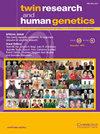巴西双胞胎研究:范围审查
IF 1.2
4区 医学
Q4 GENETICS & HEREDITY
引用次数: 0
摘要
巴西的双胞胎研究在国际上的代表性不足,本研究的动机是加深对巴西双胞胎研究的了解,以努力纠正这种状况。我们的目的有三:(1) 根据知识领域对巴西的双胞胎研究进行全面调查;(2) 与其他领域相比,评估心理学领域研究的代表性;(3) 评估可能导致其被排除在 50 年双胞胎研究综合荟萃分析之外的研究特点。根据 PRISMA 指南进行了范围界定审查。在六个数据库中检索了截至 2022 年的标题和摘要:使用选定的葡萄牙语和英语关键词(如 "双胞胎 "和 "巴西";"孪生 "和 "巴西";"gemelaridade"[孪生]和 "gêmeos"[双胞胎])在 CAPES、BDLTD、PePSIC、PubMed、Google Scholar 和 SciELO 等六个数据库中检索了截至 2022 年的论文标题和摘要。有 340 篇出版物被纳入审查范围。其中约一半(53.8‰)采用经典的双胞胎设计来研究几种性状的遗传率,另一半(46.2%)采用其他研究设计。范围审查显示,出版物的数量大约每 10 年翻一番。大多数出版物来自健康领域,其中医学研究约占一半,其次是心理学、牙科学和生物学。我们发现,近年来巴西科学家对双胞胎研究的兴趣与日俱增,我们有理由对这一趋势在全球范围内的潜在影响充满热情。本文章由计算机程序翻译,如有差异,请以英文原文为准。
Brazilian Twin Studies: A Scoping Review
The current study was motivated by an interest in deepening understanding of Brazilian twin research, which is underrepresented internationally, in an effort to rectify this situation. Our aim was threefold: (1) to carry out a comprehensive investigation of Brazilian research on twins according to the area of knowledge; (2) to evaluate the representation of research in the field of psychology in comparison with other areas; (3) to evaluate characteristics of the research that may have contributed to its exclusion from the comprehensive meta-analysis of 50 years of twin research. A scoping review was performed according to PRISMA guidelines. Titles and abstracts were searched up to 2022 in six databases: CAPES, BDLTD, PePSIC, PubMed, Google Scholar, and SciELO, using selected keywords both in Portuguese and in English (e.g., ‘twins’ and ‘Brazil’; ‘twinning’ and ‘Brazil’; ‘gemelaridade’ [twinning], and ‘gêmeos’ [twins]). Three hundred and forty publications were included in the review. Approximately half (53.8‰) used the classic twin design to investigate the heritability of several traits, and the other half (46.2%) used other research designs. The scoping review showed that the number of publications doubled approximately every 10 years. Most publications were from the health area, with medicine accounting for approximately half of the studies, followed by psychology, odontology, and biology. We found that the interest in studying twins among Brazilian scientists is increasing over the years and there are reasons to be enthusiastic about the potential impact of this trend in the global scenario.
求助全文
通过发布文献求助,成功后即可免费获取论文全文。
去求助
来源期刊

Twin Research and Human Genetics
医学-妇产科学
CiteScore
1.50
自引率
11.10%
发文量
37
审稿时长
6-12 weeks
期刊介绍:
Twin Research and Human Genetics is the official journal of the International Society for Twin Studies. Twin Research and Human Genetics covers all areas of human genetics with an emphasis on twin studies, genetic epidemiology, psychiatric and behavioral genetics, and research on multiple births in the fields of epidemiology, genetics, endocrinology, fetal pathology, obstetrics and pediatrics.
Through Twin Research and Human Genetics the society aims to publish the latest research developments in twin studies throughout the world.
 求助内容:
求助内容: 应助结果提醒方式:
应助结果提醒方式:


